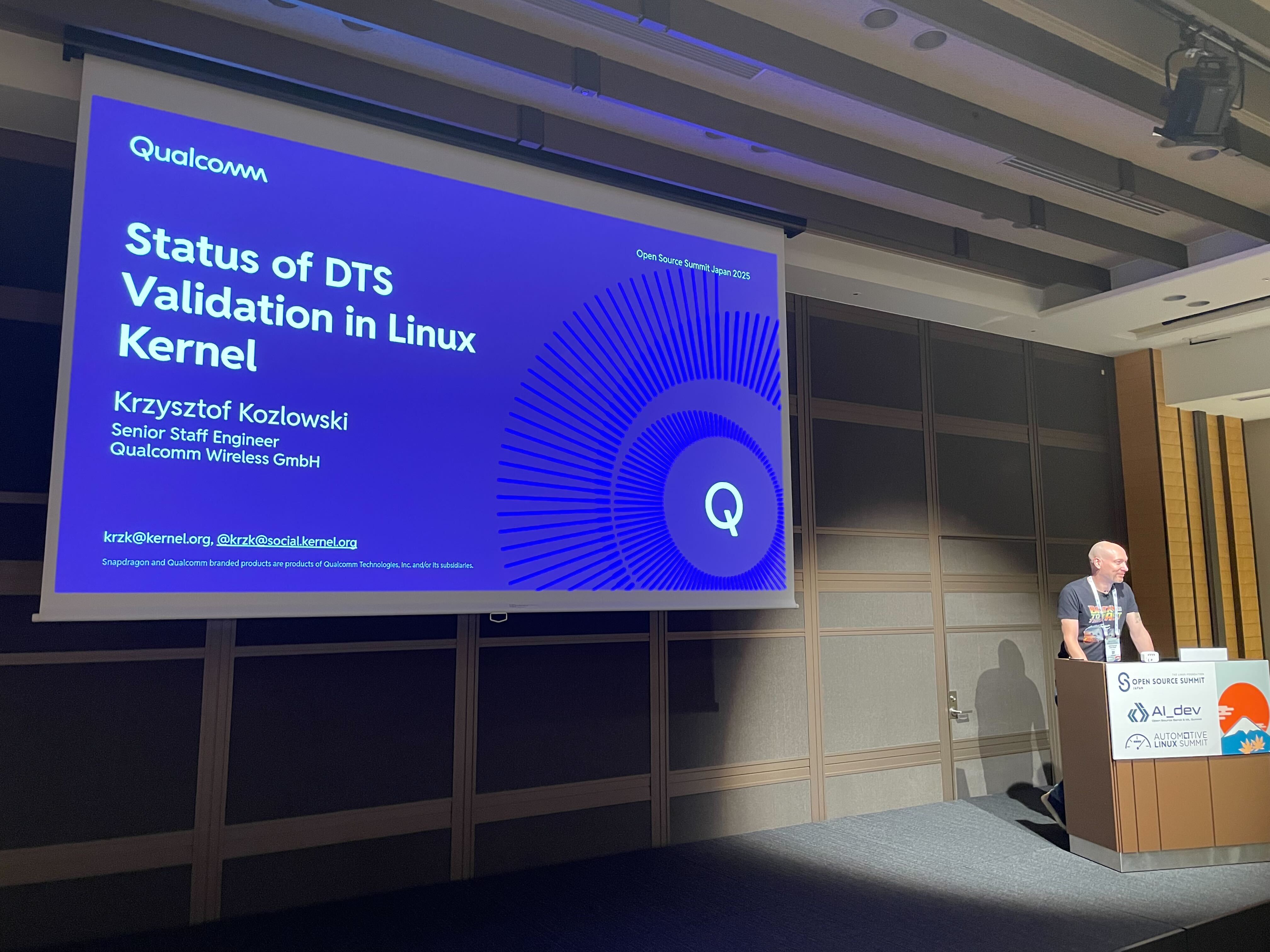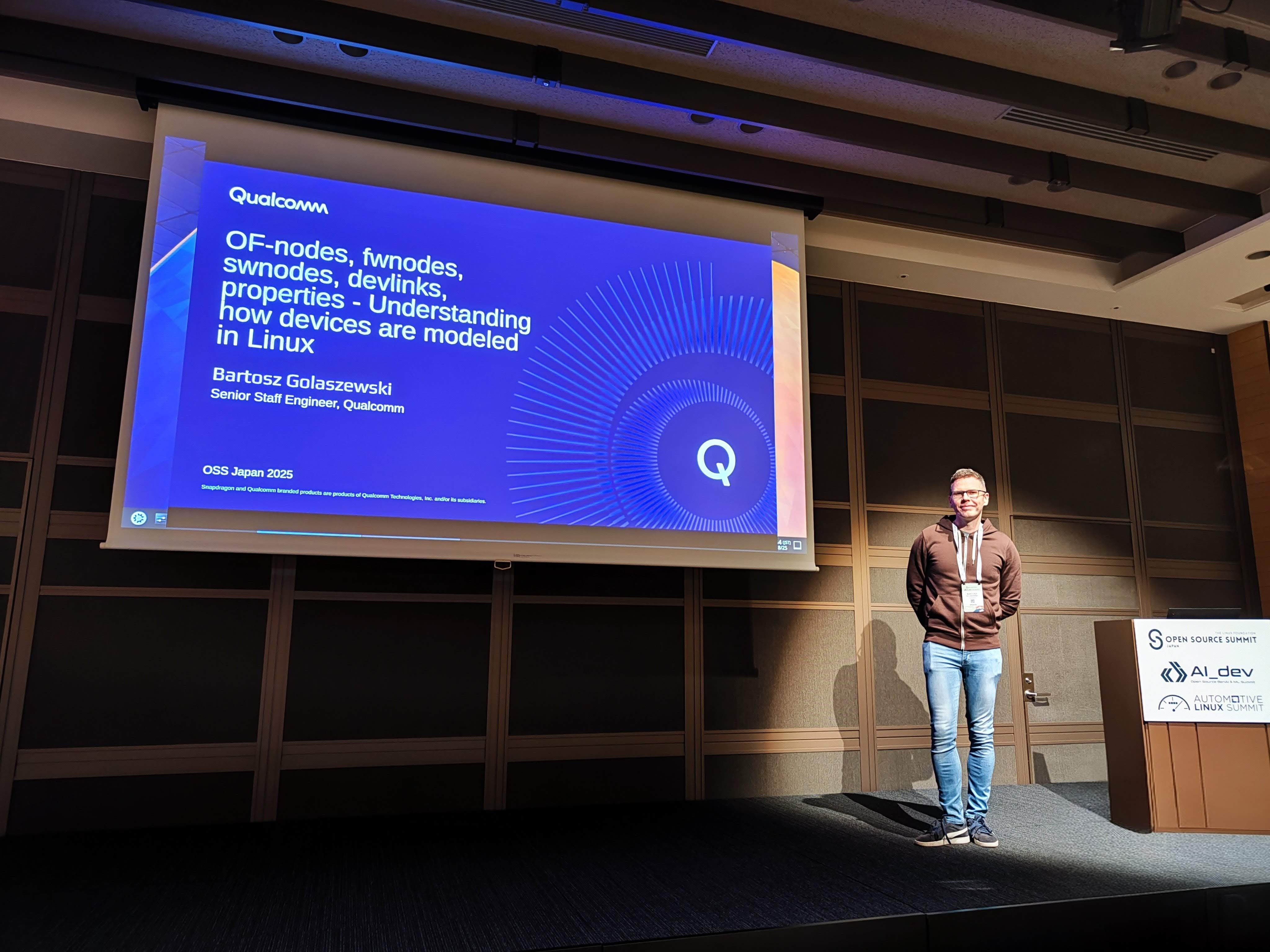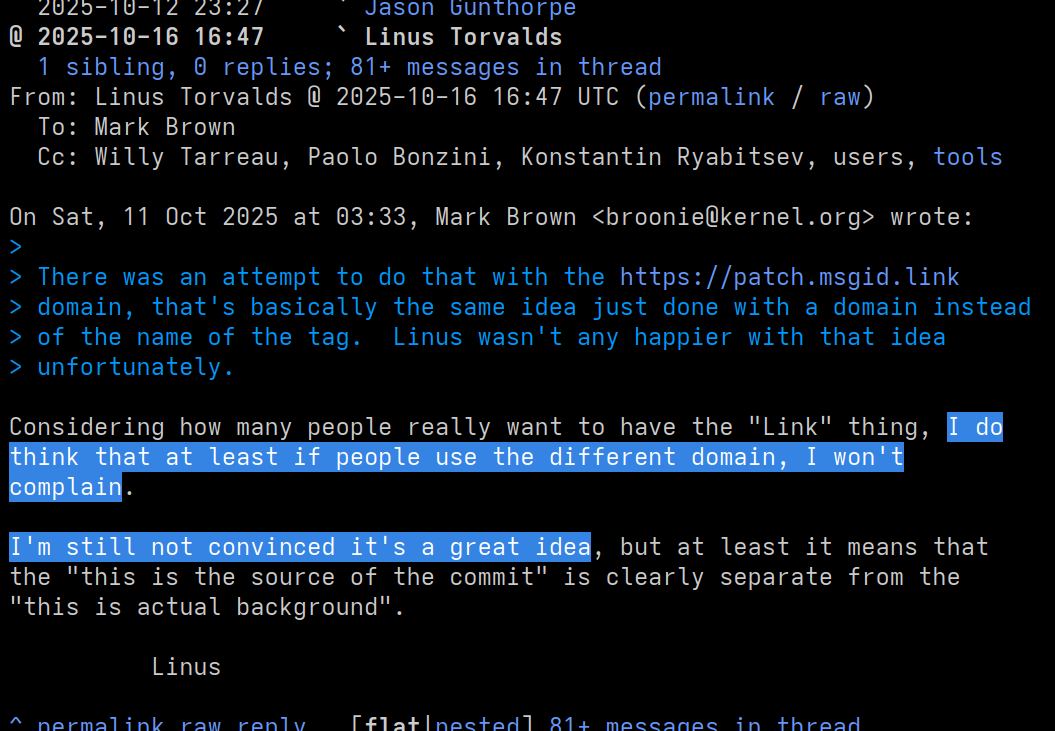Posts
295Following
39Followers
293#standwithukraine 🇵🇱 🇪🇺 🇺🇦 🇨🇭
IRC: krzk
Kernel work related account. Other accounts of mine: @krzk@mastodon.social
GitHub: https://github.com/krzk/
Traveling Instagram / Wanderquak: https://www.instagram.com/wanderquak/
Home brewery: https://brewalot.ch
Our gardening (and worm farm!): https://growalot.ch
Krzysztof Kozlowski
krzkReview on mailing list:
Copyright (C) 2026 Variscite Ltd. AI bot review and may be useless.
Copyright year is 2026, which is in the future. Should be 2024 or current year.
Great, now everyone will get to read useless AI agent reviews.
https://lore.kernel.org/all/20260303210131.2966214-8-Frank.Li@nxp.com/
Krzysztof Kozlowski
krzkWell, it does not have to be truly fake, but because of lack of negative reviews, what you have is score built only on positive experiences + advertisements.
Two of my honest, not defaming, describing real experience, negative (1-star and 2-star) reviews of two places in Munich from some visit in 2023 got removed by "defamation" process. It's the process where you as customer can do nothing, your review will be gone and Google will completely ignore your appeals.
I can assume that many or even most of negative reviews older than 2 years will be just removed by Google using this German defamation process, leaving only positive ones.
In the same time these places have many 5-star review written by agencies, posting similar AI-generated ludicrously exaggerated poetry, which obviously no one will ever drop, because they are not a defamation.
So please remember - Google Maps in Germany is full of crap reviews.
tnt
tnt@chaos.socialIf you're a swiss resident ( or know one ... ) you can get a custom hardware design onto an ASIC for FREE !!!
You get back one chip with your design (and a bunch of others!) and some board to help bring up/testing.
Also, this is "resident", no need to be a student or at uni or anything, you just need a valid Swiss address ...
I know I might be repeating myself here because I mentioned it a few month back but this bear repeating IMHO.
https://swisschips.ethz.ch/news-and-events/tiny-tapeout-submission-form.html
PS: Can I haz boost for reach ?
Krzysztof Kozlowski
krzkSuch a disappointment @lfeurope @linuxfoundation
Krzysztof Kozlowski
krzkYet my newest brew on https://brewalot.ch/ - the Milkshake New England IPA - gets nice low 3.7% alcohol by volume at 11 *P, beautiful creamy foam, intense fruity smell and low hoppy bitterness with just a pinch of sweetness.
Om nom nom...
Krzysztof Kozlowski
krzkBoth - Google/Gmail and Microsoft/Outlook - probably should be considered as evil and non-cooperative email providers.
Our decentralized workflow met reality of big monopolies caring only about themselves. Basically Google and Microsoft (lack of) response is actively impacting kernel development in a negative way.
I know this post will be ignored, so how about removing Google and Microsoft @LWN Kernel Development Statistics, so they will notice the problem?
Krzysztof Kozlowski
krzkNaaah, I'm a bit joking, just a proper thing to do instead of hoarding maintainers entry and not replying to emails.
Krzysztof Kozlowski
krzkhttps://web.git.kernel.org/pub/scm/linux/kernel/git/soc/soc.git/commit/?h=arm/fixes&id=a3b80161fbd06b5dbc0af8f29f8ae58c4aebf0b2
Krzysztof Kozlowski
krzkThat's how you don't waste time of the audience during your speech. :)
Tokyo was cool, that was my third visit to Japan and second trip to Tokyo. But beside the city, time spent for Linux Plumbers Conference is as usual priceless. See you next year in Prague!
https://youtu.be/AN_3EA7gv04?si=1eBljSyw57zuzcNt&t=5
Krzysztof Kozlowski
krzkIt seems I will need to keep repeating this talk :)
https://sched.co/29Foi
Krzysztof Kozlowski
krzkhttps://sched.co/29Foi
I will also have a shortened version at the Linux Plumbers Conference, just a few days after.
#OSSummit #OSSJapan2025 #LinuxPlumbers
Anne Applebaum
anneapplebaum@journa.hostThis is not a peace plan. It is a proposal that weakens Ukraine and divides America from Europe, preparing the way for a larger war in the future. In the meantime, it benefits unnamed Russian and American investors, at the expense of everyone else.
https://www.theatlantic.com/ideas/2025/11/trumps-war-peace/685024/?gift=hVZeG3M9DnxL4CekrWGK3x5H8-x30wTOq6lDtv0xjW4&utm_source=copy-link&utm_medium=social&utm_campaign=share
Krzysztof Kozlowski
krzk$ git describe
v6.18-rc3
$ git shortlog -s -n --no-merges
Oh! 5th place!
Don’t stop me now
I’m having such a good time
I’m having a ball
Don’t stop me now
Krzysztof Kozlowski
krzkhttps://git.kernel.org/pub/scm/linux/kernel/git/torvalds/linux.git/commit/?id=b2a578f3127ab9ef80114cef9b20a2b42a8ee77a
Arnd, previously the sole SoC maintainer, handled pull requests and patches from several other sub-maintainers for each SoC sub-architecture (e.g. Qualcomm, NXP) and other driver trees. The SoC tree was one of the busiest, if not the busiest, trees in kernel - visible on @LWN graph: https://lwn.net/Articles/981742/
With this change the load will hopefully spread.
Thorsten Leemhuis (acct. 1/4)
kernellogger@hachyderm.ioTWIMC, the "Linus opposes Link: tags with links to the patch submission" is saga over, as Linus wrote:
""[…] I do think that at least if people use the different domain, I won't complain.
I'm still not convinced it's a great idea, but at least it means that the "this is the source of the commit" is clearly separate from the "this is actual background". […]""
Kristian Kiehling
Kristian_Kiehling@mastodon.socialNot only did a permanent member of the UN security council attack a clearly marked UN humanitarian convoy with FPV Drones, they also proceed to proudly share the footage of their appalling crime on the internet.
Krzysztof Kozlowski
krzkWhen a vendor wants to control upstreaming process and objects to community-led patches, I’ll just point to this brilliant response from @conor:
It’s only better if <vendor name> submits better quality patches (no evidence for that yet) or submits the patches more promptly than others (which clearly has not happened here), and offers review commentary etc at a higher standard and more frequently than a non-employee maintainer would be able to do (there’s no evidence for that so far either, given you’re trying to stall this patchset). Your claim seems to have no merit as there is no proof that you’d do a better job.
https://lore.kernel.org/all/20250925-jaundice-uneasy-ff8b3b595879@spud/
Linaro Limited
LinaroLtd@mastodon.socialCollaboration and communication are at the heart of Linux kernel development. In the second part of our series, we explore how to work effectively with the Linux kernel community.
Read more here 👉 https://lnkd.in/eYgrqWZs






